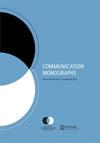Victim, villain, or scapegoat? Mediating organizational crises embedded in social problems and the transformation of order
IF 3.1
2区 文学
Q1 COMMUNICATION
引用次数: 0
Abstract
ABSTRACT Western crisis communication theories focusing on individual attribution and stable underlying norms fail to account for crises embedded in larger social problems that lead to regulatory changes. By analysing three cases that Chinese crisis managers initially identified as “commission”, “control” and “agreement” situations (Bradford & Garrett, 1995) but ended up as crises involving “absent standards”, “bad standards” and “overrated standards”, in which the first two resulted in normative changes, we highlight the deliberative potential of crisis communication embodied in the “standards situation”. When neither journalistic narratives portraying the accused as a “villain” nor organizational accounts foregrounding a “victim/scapegoat” self-perception can contain attribution at individual levels, the society enters a deliberative mode that interrogates actors’ collective guilt complicit in a crisis.受害者、恶棍还是替罪羊?调解社会问题中的组织危机和秩序转变
西方危机传播理论侧重于个人归因和稳定的基本规范,未能解释嵌入更大社会问题中的危机,这些问题会导致监管变化。通过分析中国危机管理者最初确定的三种情况,即“委托”、“控制”和“协议”情况(Bradford&Garrett,1995),但最终演变为涉及“缺失标准”、“糟糕标准”和“高估标准”的危机,其中前两种情况导致了规范性的变化,我们强调了危机沟通的协商潜力体现在“标准情境”中。当将被告描绘成“恶棍”的新闻叙事和预测“受害者/替罪羊”自我认知的组织叙事都不能包含个人层面的归因时,社会进入了一种审议模式,审问参与者在危机中的集体罪行同谋。
本文章由计算机程序翻译,如有差异,请以英文原文为准。
求助全文
约1分钟内获得全文
求助全文
来源期刊

Communication Monographs
COMMUNICATION-
CiteScore
5.40
自引率
0.00%
发文量
12
期刊介绍:
Communication Monographs, published in March, June, September & December, reports original, theoretically grounded research dealing with human symbolic exchange across the broad spectrum of interpersonal, group, organizational, cultural and mediated contexts in which such activities occur. The scholarship reflects diverse modes of inquiry and methodologies that bear on the ways in which communication is shaped and functions in human interaction. The journal endeavours to publish the highest quality communication social science manuscripts that are grounded theoretically. The manuscripts aim to expand, qualify or integrate existing theory or additionally advance new theory. The journal is not restricted to particular theoretical or methodological perspectives.
 求助内容:
求助内容: 应助结果提醒方式:
应助结果提醒方式:


